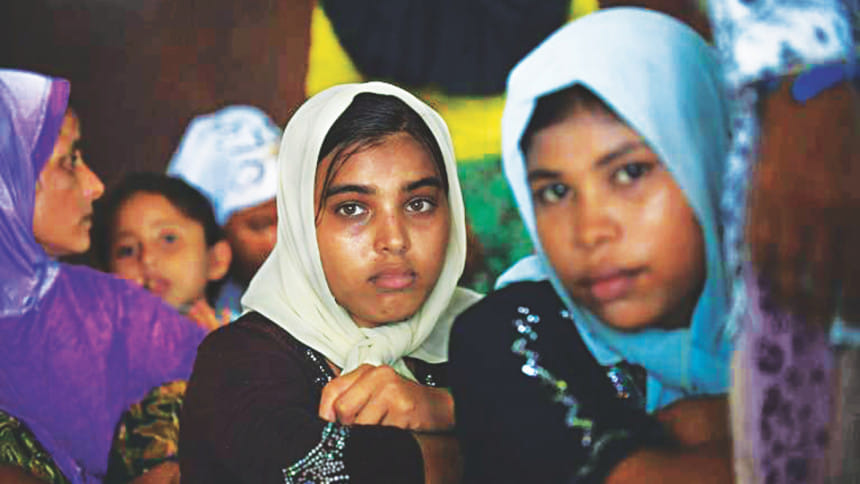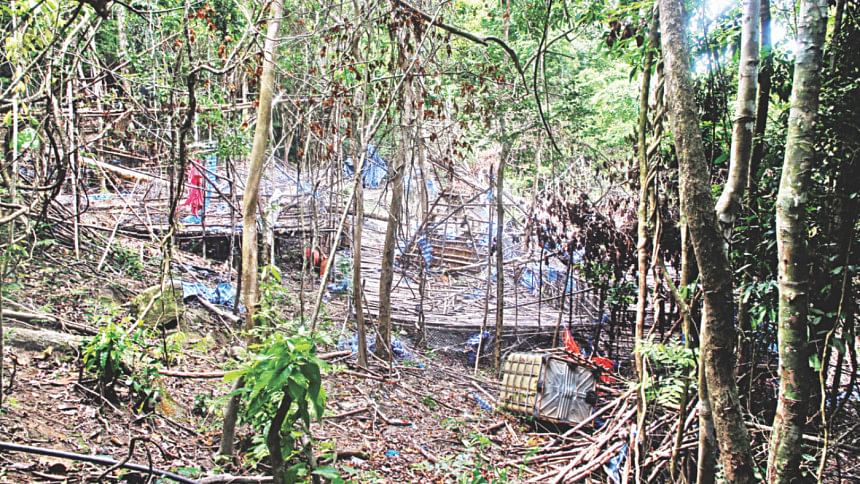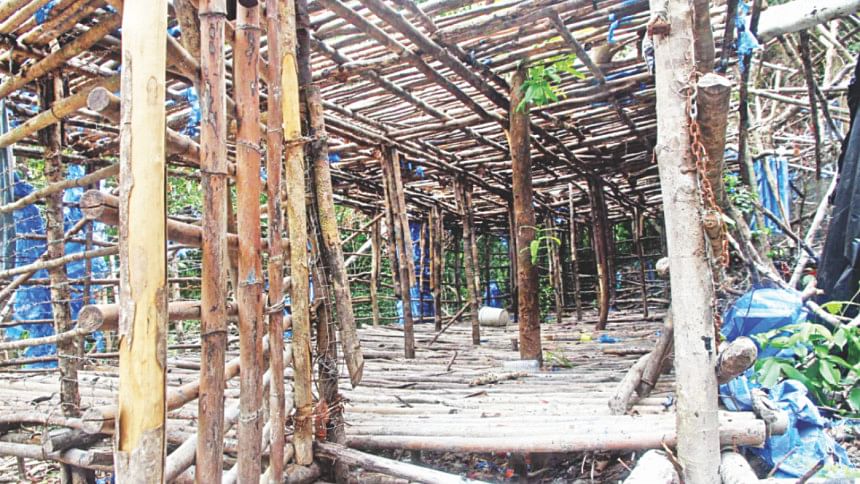Women are sexually abused all the way

Afia (not her real name) was not accompanied by any of her family members, but she showed no signs of jitters. While many in the vessel turned pale in panic due to want of food and water in the perilous sea, the beautiful young girl held her nerves.
Everything had apparently been neatly arranged, the 18-year-old thought. Her would-be-groom had already paid the brokers a hefty sum of money and was waiting near the Thai-Malaysia borders to greet her.
Turning her head as if to get a glimpse of the Myanmar coastline she left behind 10 days ago, Afia heaved a sigh of relief: the miseries back home wouldn't touch her anymore. Just a few days and she would get married in Malaysia!
But the situation on the other side -- at a jungle camp in Sadao district of bordering Thai province of Songkhla where her fiancé went to receive her -- was beyond her imagination. As soon as he reached there from Malaysia, guards of the camp confined him to a cage at gunpoint.
Without allowing Afia, who landed nearby two days later, to see her would-be-groom, the traffickers herded her along with a few hundred others towards a large cage made of wood and barbed-wire and covered with thin plastic sheet.
A few days later, one of the guards took her by surprise by offering his hand in marriage.
"That had dimmed all my hopes. I was sensing something bad but not as worse as that," Afia said identifying the guard as a Rohingya.
The guard forced her to live with him there for seven months before disappearing all on a sudden, she told Chris Lewa, coordinator of The Arakan Project, an advocacy group which has been monitoring Rohingya refugee situation and maritime movements in Bangladesh, Thailand and Malaysia since 1999.
Describing Afia's ordeal to The Daily Star, Lewa said one of the smuggled families, who were on the same trafficking vessel as Aifa and had paid ransom for freedom, took Afia to Malaysia with them later on.
"When I met her at a camp in Malaysia last year, she was still looking for her would-be-groom," Lewa told The Daily Star.
Many believe the man was killed in the jungle, the coordinator added.

WOMEN MADE SEX SLAVES
Many Rohingyas who moved to Malaysia to flee persecution at home bring their daughters and sisters there for marriage, while many others pay the traffickers a hefty amount for bringing their would-be-wives by the sea.
Though risky, they consider the illegal boat voyage cheaper and affordable, Lewa said.
After weeks of perilous sea journey -- packed below trawler decks in cramped conditions with limited food and water and very poor sanitation, many women end up falling victim to physical torture for ransom, gangrape and forced marriage.
Apart from torture for ransom, many Muslim Rohingya women were subject to gangrape by their captors, according to victims and rights activists.
"Every night, two to three young and pretty Rohingya women were taken out from the detention pens by the guards to a clandestine place," Nur Khaidha Abdul Shukur, a Rakhine victim from Maungdaw who passed through a trafficking camp in Thai border town of Padang Besar last year and is now staying in Alor Setar, Malaysia, told the Bernama news agency.
"They were gangraped by the guards," she said, adding that women sometimes were taken away by guards for several days to be used as sex slaves.
Two young women, who had been held at the transit camp for more than six months, became pregnant after gangrape, said Khaidha, who entered Malaysia illegally late last year after paying the smugglers a big amount for her release from the Thai camp.
The victims of such abuse were not allowed to talk among themselves and none of them risked beating by the guards by doing so, she added.
Her husband Nurul Amin Nobi, who managed to escape from a trafficking camp after 22 days at Wang Kelian in Malaysia last year, also spoke of similar crimes being committed at nearby camps on Malaysian side of the border.
"In the night, several of the guards used to go to the pens housing the women and take them to a nearby place," he said.
"We heard the shrieks and cries of the women because the place they raped them was very close to our pens," he said, adding that they could not see what was happening in the dark of the night.
Some of the women who failed to pay the ransom were taken somewhere else and they never returned, the Arakan Project coordinator said quoting the victims.
During a visit to the southern border of Thailand last month, this correspondent met Thai security officials who admitted to having heard of similar experiences from the victims.
Chris Lewa, however, said she did not meet any such Bangladeshi victims.
"The women being smuggled by the sea are mostly from Myanmar, most of them are Rohingyas. Many of them board the trawlers with their children."

ABUSE ON VESSELS TOO
Two Bangladeshi trafficking victims, whom the police arrested at a jungle camp in Padang Besar, told The Daily Star that women were raped every night during their voyage in December, 2013.
The women victims, all of whom were from Rakhine and other parts of Myanmar, were kept at one corner of their modified fishing trawler. The traffickers used a thick plastic sheet to separate them from the male victims, they added.
"During the night, the brokers used to go there and [sexually] abuse them," said Nur Alam, an 18-year-old boy from Shariatpur who was duped to a boat by one of his neighbours with a false promise to take him to Malaysia.
Though the victims would protest and cry at the beginning of the voyage, they stopped later as the traffickers mounted torture on them in front of their children and threw some people into the sea for protesting, they said.
"All of us understood what was happening but could not protest due to torture and fear of being thrown into the sea," said Shahabuddin, another Bangladeshi survivor from the boat.
The ordeals of the Rohingyas and Bangladeshis came to light after discovery of mass graves in Songkhla on May 1. The Malaysian government on May 25 also announced to have discovered 139 similar graves in a series of 28 camps on the Malaysian side of the border.

 For all latest news, follow The Daily Star's Google News channel.
For all latest news, follow The Daily Star's Google News channel. 



Comments